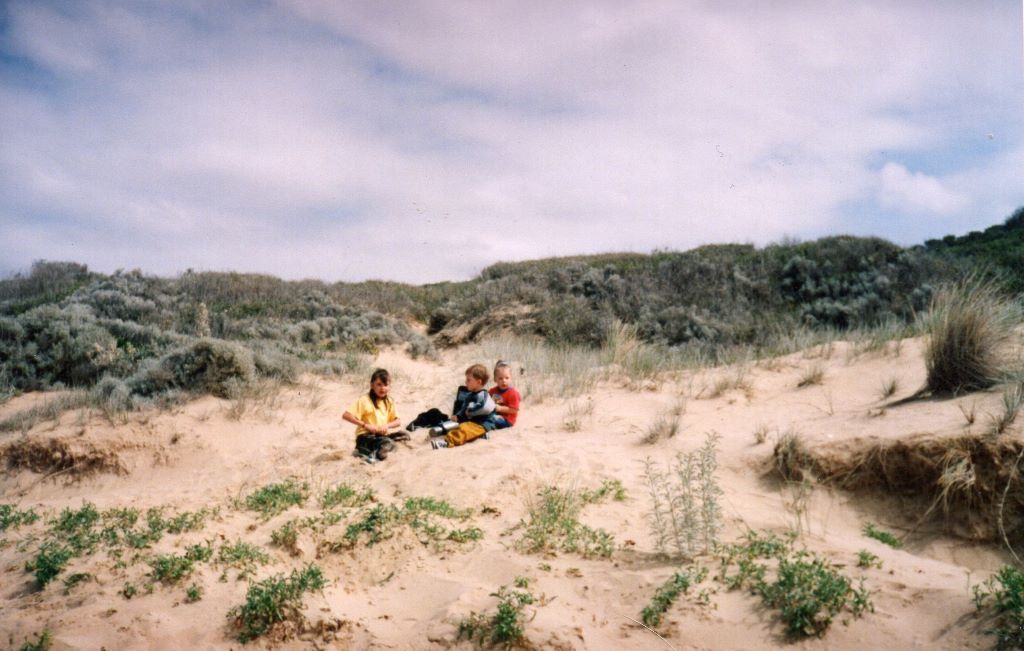Wilderness comes in many forms. There is the wilderness which is sprawling and green, which pushes out from the sand dunes and creeps upwards into the light. It twists and gnarls in the sea breeze, becomes tough and grey, leathery and defiant all over. There is the wilderness of the sea, its metallic mass which is at once still and infinite, stretching into the distance, and also rushing, foaming, onto the shore, like a dog on the attack.
There is also the wilderness which lives within people, which too is sprawling and, where it can, grows towards the light. This was the wilderness which consumed my parents, barely thirty, and took them to a vacant acre of coastal Tea-trees on Gippsland’s Ninety-mile Beach. So it happened that, one summer, they built a little red cedar house on a sand dune in the hamlet of Golden Beach. It was here at our little weekender, almost twenty years ago, that I first met the natural world.

Nature isn’t always kind, nor welcoming. There were ghosts there, my parents will still tell you if you ask, and I think I know something of what they meant. Even in my childhood innocence, I could feel the sinister darkness falling thickly upon the land when we arrived on a Friday night. It had substance of its own, and hunger – swallowing everything we passed as we drew nearer to the house.
Who are you? asked the wind rushing through the treetops, and the low moan of the sea. Why are you here?
It felt as though we had woken something that was resting, that we had broken a delicate equilibrium of sand and air and trees. It felt like we were imposing.
The first night would always be uneasy for my parents, even if I easily drifted into the rich sleep of childhood. But then came the morning, whose light shone through the gaps in the curtains and rested on my cheek, whose birdsong at once filled the house and my imagination with music.
I am here, said the beach from the very first. It wasn’t an invitation as much a declaration. It could be heard from our veranda, but it would take time to get there. My parents would lead me and my siblings, the oldest no more than twelve, myself about five, along the gravel road, lined with overhanging branches of coastal scrub. Heading down, down, to the roaring sea.

In the photo above, you can see the clearing between those two Tea-trees. You could easily miss it, if you didn’t know exactly where it was. But we did. We pushed on into that slight gap in the green wall and found ourselves on a rough, sandy path. The canopy had swallowed us and the light fell only in little patches which danced as the wind blew through the trees.
We would race ahead of Mum and Dad, tearing towards the light ahead – why wouldn’t we? We were as wild then as the rosella which tore through the sky, or the dragonfly, or the tall, creaking trees themselves. Suddenly the myriad things which stabbed at our feet became scarcer, and our heels soon sank into soft, warm sand. And we’d pause a moment – was it to wait for our parents, or was it out of reverence for the beast which came into view as we climbed that final dune?
Of the beach I remember everything. The undulating dunes, a whole expansive landscape to be explored. How many different types of plants grew here! I could see Everlastings, Cushion Bush and Atriplex, a world of greys and greens springing up here and there according to their own natural rhythm. There was so much richness here, of all places – here, where the wind rushed recklessly, carrying the desiccating salt spray with it. Here, where the sun shone so white that we all squinted hard against it.

But all the while, I felt the suspicious glare of the ocean. Come on, Brady, my parents would call from the shallows, but I could see that the water was like iron, that it went on forever, that the waves crashed and foamed, roaring at me. Instead, I would wait in the dunes with the Saltbush and the Marram Grass and feel the weight of the whole ocean rock and tear and growl. Amongst the towering dunes, in the quiet world of the plants, I would let my feet sink deeper into the sand.
Like all things which inspire fear, the ocean was captivating in its wild beauty. I’d see the beast of the sea stretch out into the impossibly wide horizon, feel its bellowing breeze whipping sand against my skin. Who could tell the ocean what to do? Who could put its perfect blue in chains?
At the end of the day, the same young family that had torn down the dunes towards the sea climbed back uphill, more soberly, crunching gravel, sticks and grasses underfoot. We were tired – the kind of tired that comes from cold water, fresh air and warm sun.
As we walked along the tree-lined drive, a hand might catch my forearm. Look, quickly, Mum would say, pointing into the green. It was our favourite, Banksia integrifolia, which grew in thick bushes here and there between the Tea-trees. It was in bloom, and in a dozen places a thousand flowers crowded into a single inflorescence, bright yellow, at once robust and delicate. Do you see it?, I’d hear, and if I was lucky enough, quiet enough, I would catch a glimpse of a Rainbow Lorikeet hanging from the dark green foliage, feeding on its nectar. We’d watch her for as long as she stayed there, pecking or chewing at the yellow cone. Sometimes seconds, sometimes minutes, I’d watch, captivated, until she was content and at last flew away.

Wilderness must have an element of defiance. How defiant is the bird which streaks the sky in red, or the setting sun which paints the blue sky an intense violet? As I sat in those dunes I loved so much, among the plants which above all refused not to thrive there, I would stare off in awe at the endlessly crashing ocean – nature’s ultimate wild expression of defiance.
I think often of the defiance that consumed my parents, who, without a penny to spare, built a house on a block of Tea-trees in a town they had never heard of. That wild place hasn’t resigned itself to an old memory of childhood summers left behind – no, that place sharpened my eye to the bird who claws its way along a branch, beyond the notice of most human eyes, or the tree which grapples with the soil so the bird can roost in its branches.
I owe it to my parents and their wildness that I grew alongside the boisterous, living world for a little while. What if everyone had their own piece of wilderness living inside them?
Banner image courtesy of Brady Hamilton.


Leave a Reply